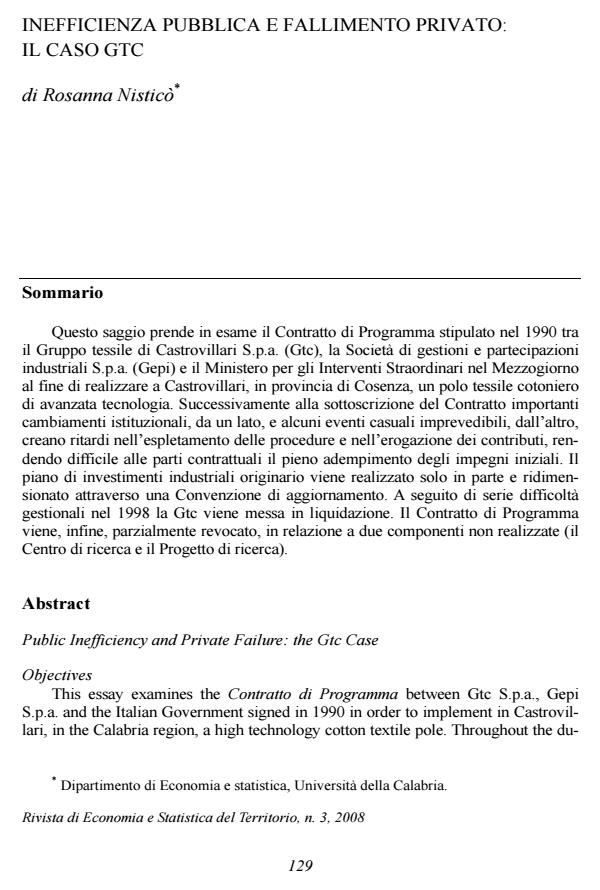Inefficenza pubblica e fallimento privato: il caso Gtc
Journal title RIVISTA DI ECONOMIA E STATISTICA DEL TERRITORIO
Author/s Rosanna Nisticò
Publishing Year 2009 Issue 2008/3 Language Italian
Pages 18 P. 129-146 File size 194 KB
DOI
DOI is like a bar code for intellectual property: to have more infomation
click here
Below, you can see the article first page
If you want to buy this article in PDF format, you can do it, following the instructions to buy download credits

FrancoAngeli is member of Publishers International Linking Association, Inc (PILA), a not-for-profit association which run the CrossRef service enabling links to and from online scholarly content.
Public Inefficiency and Private Failure: the Gtc Case Objectives. This essay examines the Contratto di Programma between Gtc S.p.a., Gepi S.p.a. and the Italian Government signed in 1990 in order to implement in Castrovillari, in the Calabria region, a high technology cotton textile pole. Throughout the duration of the CdP a number of relevant institutional changes gave rise to delays in the payment of public funds, making it difficult for the private party to carry on the initial project as planned. So, the investment projects were revised and reduced by means of a new agreement between parties, called Convenzione di aggiornamento. In consequence of the serious difficulties in firm’s management and finance, the Gtc company went into liquidation in 1998. The CdP was partially revoked in 2001, as regards two unfulfilled projects (the Research Centre and the Research Project). Methods and Results This case-study has been carried out both by means of interviews with several protagonists of this experience (the entrepreneur, trade-unionists, ex Gtc workers) and the examination of official documents from Government archives. Conclusions Three main suggestions on improving the efficacy and efficiency of CdP stem from this case study: i) the importance of considering the internal coherence of the measures, making each single project in the CdP able not just to coexist, but also to evolve together; ii) the necessity of taking into account the different interests of each contractual party in carrying out all the project included in the Contract; iii) the importance of aligning the time of bureaucracy with the firm’s time given the importance of market and financial constraints.
Rosanna Nisticò, Inefficenza pubblica e fallimento privato: il caso Gtc in "RIVISTA DI ECONOMIA E STATISTICA DEL TERRITORIO" 3/2008, pp 129-146, DOI: